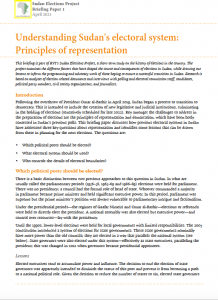This briefing is part of RVI’s Sudan Elections Project, a short-term study on the history of elections in the country. The project examines the different factors that have shaped the course and consequences of elections in Sudan, while drawing out lessons to inform the programming and advocacy work of those hoping to ensure a successful transition in Sudan. Research is based on analyses of election-related documents and interviews with polling and electoral commission staff, candidates, political party members, civil society organizations, and journalists.
Following the overthrow of President Omar al-Bashir in April 2019, Sudan began a process to transition to democracy. This is intended to include the creation of new legislative and judicial institutions, culminating in the holding of elections (tentatively scheduled for late 2022). Key amongst the challenges to address in the preparation of elections are the principles of representation and demarcation, which have been hotly contested in Sudan’s previous polls. This briefing paper discusses how previous electoral systems in Sudan have addressed three key questions about representation and identifies some lessons that can be drawn from these in planning for the next elections.




